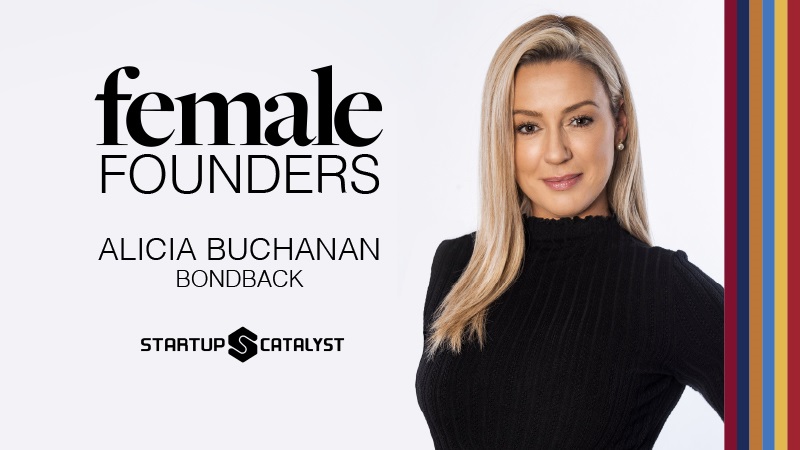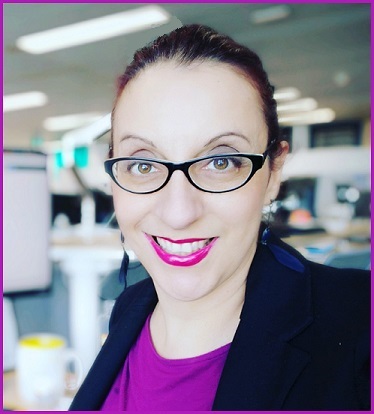Welcome to ‘Female Founders’, the Information Age series profiling 12 women who have grabbed the entrepreneurial reins and ridden into the unpredictability of start-up life.
We talk to the women about their business, entrepreneurship journey and advice they’d give to other women considering starting their own business.
Information Age interviewed all 12 women on the Start-up Catalyst Mission to London this year. Start-up Catalyst runs regular missions for start-ups, investors, and other leaders to some of the world’s top tech hotspots, such as Silicon Valley, Israel, Hong Kong and London. The goal? To transform both the individual and innovation landscape in Australia.
Today we speak with Alicia Buchanan, founder of BondBack.

Name: Alicia Buchanan, founder
Business: BondBack
Established: 2018 in Cairns
No. of employees: 3
No. of customers: 13
Information Age: Tell me about your business.
Alicia: BondBack is a booking platform for end of residential tenancy services with communication between agents, tenants and contractors.
IA: What problem does your business solve?
Alicia: We're solving the issue that tenants are facing, along with agents, at the end of a tenancy with regards to arranging services, such as cleaning, and the issues that tend to occur between tenants and agents over the condition a property needs to be left in before vacating.
Often there are tenants that would like to clean the property themselves but then face the agent coming in afterwards and meticulously critiquing whether or not it was done to their standard.
Typically, when that actually occurs, the property will remain in that state for several days before the tenant can come back or they can arrange a contractor to complete it.
The turnover of the property is then delayed and landlord’s income is halted. It also irritates the tenant as they’re trying to move forward into a new property, unpack and start their new life going forward.
This ends up causing a rift in relationship between the agent and tenant, so nobody has a good story at the end of that experience.
IA: How did the idea for your business come about?
Alicia: The last five years I've moved significantly. I have lived overseas and come back multiple times in the last five years and have moved around my regional area because I can and it's fun!
I decided to make it an actual business venture when I had my last trip over to Chicago for a different start-up and was listening to pitches of cleaning companies which specialize in Airbnb cleans.
There was a lot of traction being gained in that space and a lot of money being injected into those businesses. I was asking myself why they were successful in comparison to lots of other major cleaning companies with the online presence just not getting that much attraction.
I realised it was because they're specialising in area which is large, has a need, and a good margin to be able to afford that.
While I was in the States, I was thinking about how to find a bond cleaner and other services easily, quickly and for a fixed price. None of that was available, so when I returned to Australia, I kicked it off.
It spent about six months doing my own R&D, looking at ABS data, surveying, polling, writing a white paper, talking to developers. Then it wasn't until I was offered a pre-seed investment of services in kind from my white paper alone, there was a discussion which validated my business concept. I didn't accept it, but it still was enough to suggest to me, ‘You better get a move on because if I'm not going to do it, these people probably will’.
IA: Who is your ideal customer?
Alicia: I want to address property agents, but I do feel that we're tenant-centric. My ideal customer is a family that is too time poor to consider cleaning but also has a budget. In the beginning of their tenancy, they can consider the subscription offer that we have where they can pay a weekly amount, say $10 a week over 6 or 12 months, and all the exit requirements are paid for and satisfied.
IA: What’s the biggest challenge you’ve faced in your business?
I’m a sole-funded, full equity. The biggest challenge I've had is launching in a remote regional area, Cairns, which is quite cliquey and resistant to change. This is a disruption-type business, and doing that in a place that is resistant to change is probably the biggest challenge I'm ever going to face! Having said that, BondBack will be launching in Brisbane shortly.
IA: Who has mentored you on your journey?
Alicia: Matt Malady is one of the founders of Temando, which is one of Australia's massive success stories with start-up businesses, and he exited his business at the very final evaluation of $100 million. We're working on a few things together, and he's just dragged me and put me under his wing!
I get calls and text messages daily just reminding me that to keep charging on, to keep doing being and considering the greater good of where I'm taking my life.
IA: Have you ever wanted to throw the towel in?
Alicia: Yes, I did, and I have.
I've had many other businesses in the past. This is my first start-up in the sense of the start-up. I've had retail businesses, two of those while running a coaching business as well. I was working over 80 to 100 hours a week with kids, really young children in daycare at 6am, out at 6pm, and not really cooking for them, just throwing something in the oven, and at the same time going through a divorce.
There was a time through there that I did say, "What am I doing? I want time to just be present, enjoy life. Why am I suffering, and no longer enjoying things?” I threw it all in, and I liquidated it. I did that because money was being argued over, and I was burning cash to keep my lawyers happy .
I went through a significant depression cycle following that. This time around, I feel definitely more equipped to observe what's coming and handle it a lot better. Even when I do have the feeling like, "What am I doing? It's time to throw in the towel in", I haven't had that yet, but I also know that those feelings are fleeting and just to power through.
IA: What would you say with BondBack what's the biggest stuff up that you've made?
Alicia: Talking very early without an NDA.
I thought I had a global name and concept. Through my experience in the United States, you ask anybody to sign an NDA, you just won’t be able to talk to them, but back here, the non-disclosure even without a actual piece of paper is not a professional observation, apparently.
I spoke to a few people with regard to my concept. Then there was a link with that person and another person who had the same day registered my business name and my domain. I realise a business isn’t in the name – it's the concept. So, I quickly engaged my lawyers. It cost me over $2,500 to make sure that was stopped right there. I then renamed, rebranded and went on.
I had a name VAC8, V-A-C-8. I know it's not as good as BondBack as far as Australians name is concerned, but it's a more global term that's used. The UK and the States don't use the term ‘bond’.
IA: What is the vision for your business, for Bond Back?
Alicia: The vision is to really pivot and engage with three customers –agents, tenants and contractors – to make that space amazing and available to everybody.
The intention is to assist tenants through their journey with awareness of their requirements, so education is important. I want to help the agents with issues at the end of a tendency where the time to turn around is delayed and the relationship breaks down.
IA: In hindsight, what's something that you could have done differently on your journey?
Alicia: I guess listening to that gut feeling a little quicker. I felt very early on – several years ago even – this is an issue nobody is addressing. But I felt that it wasn't significant enough to start putting my attention into.
Then having gone through several journeys in life, you sometimes arrive back at places where we should have taken off. I really think that in hindsight, listening to myself a little earlier and not consenting myself at other people's opinions or thoughts about what I should or shouldn't be doing.
IA: How have you funded your business to date?
Alicia: Completely bootstrapped.
IA: Do you have any plans to raise capital?
Alicia: Yes, I do. Fortunately, this trip [to London] has actually put a rocket up my butt to do that because I know that to expand the way I want to, I'm going to need to put the system on steroids, so to speak, and build the team out.
I've got my plans to relaunch in Brisbane. We'll test the ground a little bit there. Then we'll be looking at, early next year, raising the seed round.
IA: Who put you on the path to entrepreneurship?
Alicia: This is going to sound awful: myself.
The last job that I had where I was privately employed, I was a bank manager with ANZ. I left because I fell pregnant with my daughter. I was in a marriage with a Sicilian husband who was very, very traditional, so he suggested to me that I wasn't going to be able to return to work, so I would be a stay-at-home mom.
Within this framework, trying to keep my family and everything together, I looked at ways to earn income and still remain at home. I had some internet-based businesses that were successful. But unfortunately, with those restrictions in a marriage, it fell apart. Then the moment that we actually left one another was when I started building larger businesses and enterprises.
My involvement in the start-up scene has been driven by my interest in the tech space and science and I want to be involved in that. It fulfills me just being amongst people that are really energised to bring and create and do.
IA: What advice would you give any women looking to enter the start-up journey?
Alicia: Don’t be afraid to ask for help. This time around, what I've done differently is ask for help from every angle. I was so shocked and surprised with how much time people were willing to give. If somebody can't help you immediately, they certainly will have you in their mind going forward.
That has been the most amazing thing for me: asking for help when I'm so used to doing it on my own but realising you can actually go a lot further by doing it. I would suggest always, no matter how prideful and how strong we are as women, ask for help amongst ourselves. We're a great network for that.
Roulla Yiacoumi travelled on the 2019 Startup Catalyst Mission to London with the Female Founders.










